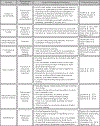A Qualitative Examination of Interprofessional Teamwork for Infection Prevention: Development of a Model and Solutions
- PMID: 35758303
- PMCID: PMC10278586
- DOI: 10.1177/10775587221103973
A Qualitative Examination of Interprofessional Teamwork for Infection Prevention: Development of a Model and Solutions
Abstract
Health care-associated infections (HAIs), such as central line-associated bloodstream infections (CLABSIs) and catheter-associated urinary tract infections (CAUTIs), are associated with patient mortality and high costs to the health care system. These are largely preventable by practices such as prompt removal of central lines and Foley catheters. While seemingly straightforward, these practices require effective teamwork between physicians and nurses to be enacted successfully. Understanding the dynamics of interprofessional teamwork in the HAI prevention context requires further examination. We interviewed 420 participants (physicians, nursing, others) across 18 hospitals about interprofessional collaboration in this context. We propose an Input-Mediator-Output-Input (IMOI) model of interprofessional teamwork in the context of HAI prevention, suggesting that various organizational processes and structures facilitate specific teamwork attitudes, behaviors, and cognitions, which subsequently lead to HAI prevention outcomes including timeliness of line and Foley removal, ensuring sterile technique, and hand hygiene. We then propose strategies to improve interprofessional teamwork around HAI prevention.
Keywords: health care–associated infections; infection prevention; interprofessional collaboration; management practices; qualitative methods; teamwork.
Conflict of interest statement
DECLARATION OF CONFLICTING INTERESTS
The Authors declare that there is no conflict of interest.
Figures
References
-
- Agency for Healthcare Research and Quality. (2019). TeamSTEPPS 2.0. https://www.ahrq.gov/teamstepps/instructor/index.html - PubMed
-
- Armat M, Assarroudi A, Rad M, Sharifi H, & Heydari A. (2018). Inductive and deductive: Ambiguous labels in qualitative content analysis. The Qualitative Report, 23, 219–221. doi:10.46743/2160-3715/2018.2872 - DOI
-
- Borek AJ, Anthierens S, Allison R, Mcnulty CA, Anyanwu PE, Costelloe C, … & Step-Up Study Team. (2020). Social and contextual influences on antibiotic prescribing and antimicrobial stewardship: a qualitative study with clinical commissioning group and general practice professionals. Antibiotics, 9(12), 859–874. - PMC - PubMed
Publication types
MeSH terms
Grants and funding
LinkOut - more resources
Full Text Sources



